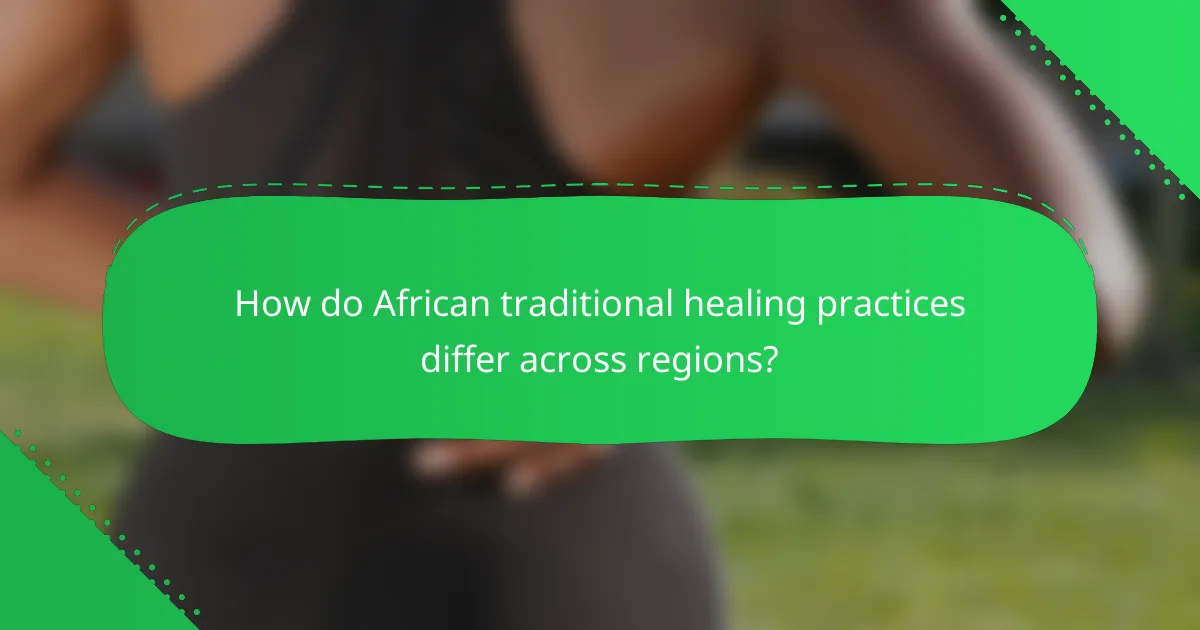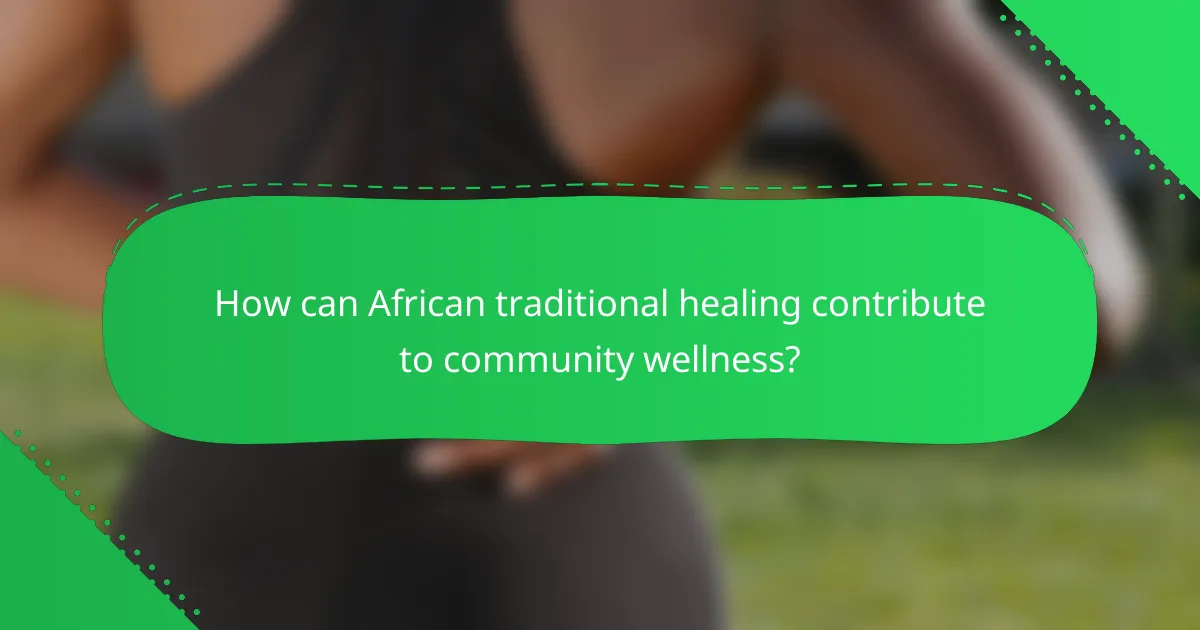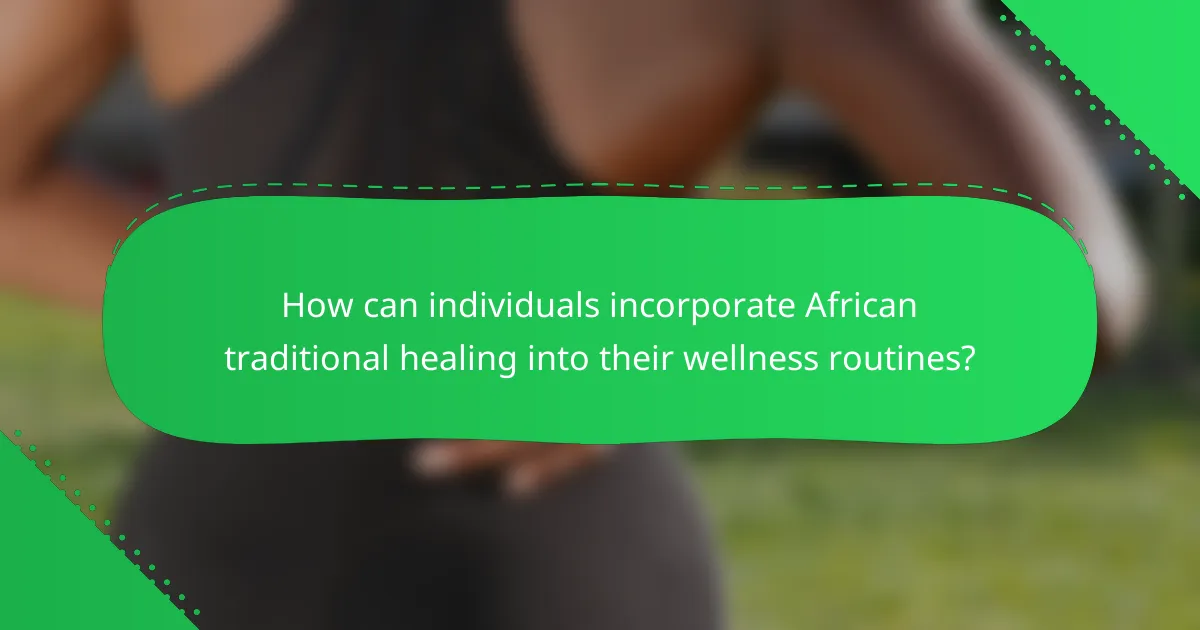African traditional healing offers a holistic approach to wellness through rituals, the use of indigenous herbs, and strong community involvement. These practices address physical, emotional, and spiritual health, enhancing individual and collective well-being. Key herbs like moringa and ginger provide significant health benefits, while rituals foster social cohesion and resilience. The integration of traditional methods with modern medicine further improves health outcomes in communities.

How do African traditional healing practices differ across regions?
African traditional healing practices vary significantly across regions due to cultural beliefs, available resources, and historical influences. In West Africa, herbal remedies often integrate spiritual rituals, while East African practices emphasize community involvement and holistic approaches. Southern Africa frequently utilizes ancestral healing, focusing on the connection between the living and the spiritual realm. Each region’s unique attributes shape its healing methodologies, influencing community wellness and health outcomes.
What are the key rituals involved in African traditional healing?
Key rituals in African traditional healing include ceremonies, divination, and herbal preparation. These rituals often involve community participation, enhancing social bonds and collective wellness. Healing dances and music are integral, promoting emotional and spiritual healing. Additionally, the use of sacred herbs during rituals reinforces the connection to nature and ancestral wisdom.
Which herbs are commonly used in African traditional healing?
Common herbs used in African traditional healing include neem, ginger, garlic, and moringa. These herbs are valued for their medicinal properties and play a significant role in promoting wellness within communities.
Neem is known for its antibacterial and anti-inflammatory benefits. Ginger is commonly used for digestive issues and inflammation. Garlic is recognized for its immune-boosting properties. Moringa is rich in vitamins and minerals, contributing to overall health.
These herbs are often incorporated into rituals and remedies, reflecting the cultural significance of natural healing practices across Africa. Their use fosters community bonds and supports holistic wellness approaches.
How do community beliefs shape healing practices in different cultures?
Community beliefs profoundly influence African traditional healing practices, shaping rituals and the use of herbs. These practices reflect cultural values, communal support, and spiritual connections.
Rituals often involve ceremonies that reinforce social bonds and collective identity. They provide psychological comfort and foster a sense of belonging. Herbs are selected based on traditional knowledge, which is passed down through generations, emphasizing the community’s unique relationship with nature.
The impact of these healing practices extends beyond individual wellness. They promote community cohesion and resilience, addressing both physical and spiritual health. This holistic approach contrasts with Western medicine, highlighting the importance of cultural context in healing.

What role does spirituality play in African traditional healing?
Spirituality plays a crucial role in African traditional healing by fostering a holistic approach to wellness. It connects individuals to their ancestors, nature, and community, enhancing the healing process. Rituals often invoke spiritual forces, promoting mental and emotional balance. Community engagement strengthens support systems, facilitating shared healing experiences. This integration of spirituality fosters resilience and a deeper understanding of health beyond physical symptoms.
How do ancestral connections influence healing rituals?
Ancestral connections profoundly influence healing rituals in African traditional healing. These rituals often incorporate ancestral wisdom, fostering community ties and enhancing individual wellness. Ancestral spirits guide practitioners, ensuring rituals align with cultural values and beliefs. This connection strengthens communal identity and promotes healing through shared experiences. The integration of herbs and rituals reflects a unique attribute of African healing, emphasizing a holistic approach to wellness.
What are the psychological benefits of spiritual healing practices?
Spiritual healing practices in African traditional healing offer significant psychological benefits. These practices foster a sense of community, promote emotional well-being, and enhance resilience against stress. Rituals create a supportive environment that encourages sharing and connection. The use of herbs can also contribute to mental clarity and emotional balance. Community involvement in healing rituals strengthens social ties, which is crucial for mental health. As a result, individuals experience improved self-esteem and a greater sense of purpose.

What are the main health benefits of specific herbs used in traditional healing?
Specific herbs used in African traditional healing offer various health benefits, including anti-inflammatory properties, immune system support, and digestive health improvement.
For instance, Moringa is known for its high nutritional content, providing vital vitamins and minerals. Another example is Ginger, which aids in digestion and alleviates nausea. Additionally, Rooibos tea is rich in antioxidants, promoting overall wellness.
These herbs not only support individual health but also enhance community wellness through shared knowledge and practices. Traditional healing rituals often incorporate these herbs, fostering a collective approach to health.
Which herbs are known for their anti-inflammatory properties?
Several herbs are recognized for their anti-inflammatory properties, particularly in African traditional healing. Key examples include ginger, turmeric, and devil’s claw. Ginger contains bioactive compounds that reduce inflammation and pain. Turmeric’s active ingredient, curcumin, is well-documented for its anti-inflammatory effects. Devil’s claw is often used to alleviate arthritis and muscle pain. These herbs contribute significantly to wellness in African communities by promoting natural healing practices.
How do adaptogenic herbs support overall wellness?
Adaptogenic herbs enhance overall wellness by balancing stress responses and promoting resilience. These herbs, integral to African traditional healing, support mental clarity, emotional stability, and physical vitality. For instance, herbs like Ashwagandha and Rhodiola are known for their unique ability to modulate cortisol levels, helping the body adapt to stress. This holistic approach fosters community well-being, as collective rituals often incorporate these herbs, reinforcing social bonds and shared health practices. The rare attribute of these herbs lies in their capacity to nurture both individual and communal health, showcasing the profound impact of traditional healing practices.

How do traditional healers integrate modern medicine into their practices?
Traditional healers integrate modern medicine by combining herbal remedies with conventional treatments. This approach enhances patient care and promotes holistic wellness. Healers often collaborate with medical professionals, sharing knowledge to improve health outcomes. For example, they may recommend herbs alongside prescribed medications, ensuring a comprehensive treatment plan. This integration respects cultural practices while embracing scientific advancements, ultimately benefiting community health.
What challenges do traditional healers face in contemporary healthcare systems?
Traditional healers face significant challenges in contemporary healthcare systems, including lack of recognition, integration issues, and limited resources. These healers often struggle to gain legitimacy alongside formal medical practitioners. Cultural biases and misconceptions about traditional healing further complicate their acceptance. Additionally, regulatory frameworks often do not accommodate traditional practices, hindering their ability to operate legally. Limited access to modern healthcare resources restricts their ability to enhance their practices and reach wider communities.
Which collaborative models exist between traditional and modern healthcare providers?
Collaborative models between traditional and modern healthcare providers include integration of herbal remedies, community health initiatives, and shared patient education. These models enhance wellness by combining traditional rituals with evidence-based practices.
One example is the use of traditional healers in rural areas, where they often serve as the first point of contact for health issues. Modern healthcare systems can collaborate with these healers to improve access to care and ensure holistic treatment approaches.
Additionally, community health programs may incorporate traditional practices, fostering trust and improving health outcomes. This synergy between traditional and modern methods can lead to a more comprehensive understanding of wellness in diverse populations.
Overall, these collaborative models reflect a growing recognition of the value of traditional healing practices in enhancing community health and well-being.

How can African traditional healing contribute to community wellness?
African traditional healing significantly enhances community wellness through rituals, the use of herbs, and social cohesion. These practices foster a holistic approach to health, integrating mental, physical, and spiritual well-being. Rituals often involve communal participation, strengthening social ties and support networks.
Herbs used in traditional medicine, such as moringa and aloe vera, provide natural remedies that address various health issues, promoting preventive care. As a result, communities experience reduced reliance on conventional healthcare, leading to increased self-sufficiency and empowerment.
Moreover, the unique attribute of African traditional healing lies in its cultural significance, which preserves ancestral knowledge and practices. This connection to heritage reinforces identity and belonging, contributing to overall community resilience.
In summary, African traditional healing practices not only address individual health needs but also cultivate social unity, ultimately enhancing community wellness.
What is the impact of collective healing rituals on community cohesion?
Collective healing rituals significantly enhance community cohesion by fostering shared experiences and mutual support. These rituals, deeply rooted in African traditional healing, utilize herbs and practices that promote physical and emotional wellness. Participants often develop stronger social bonds, creating a sense of belonging and unity. As a result, communities become more resilient and better equipped to address collective challenges. Healing rituals also serve as cultural touchstones, preserving traditions while reinforcing communal identity.
How do traditional healing practices promote mental health in communities?
Traditional healing practices enhance mental health in communities through rituals, herbs, and social support. These practices foster a sense of belonging and identity, which are crucial for emotional well-being.
Rituals often involve communal gatherings that strengthen social ties, promoting collective healing. For example, ceremonies can address grief and trauma, allowing individuals to share experiences and find solace.
Herbs used in traditional healing, such as St. John’s Wort and Ashwagandha, are known for their calming effects. These natural remedies can alleviate symptoms of anxiety and depression, contributing to overall mental wellness.
Additionally, the community impact of traditional healing is significant. It encourages mutual support and understanding, creating a network that helps individuals cope with mental health challenges. This holistic approach emphasizes the interconnectedness of body, mind, and community.

What are the unique attributes of specific African healing practices?
Unique attributes of specific African healing practices include the integration of spiritual rituals, the use of indigenous herbs, and the emphasis on community involvement. These elements foster holistic wellness by addressing physical, emotional, and spiritual health. For example, rituals often involve ancestral connections, while herbs like African ginger provide specific health benefits. The community’s role enhances social support, creating a network that promotes healing and resilience.
How do local flora influence the choice of healing herbs?
Local flora significantly influences the selection of healing herbs in African traditional healing practices. The availability of specific plants determines which herbs are used for various ailments, shaping local healing rituals. For example, indigenous knowledge guides the community in identifying effective herbs based on their properties and the local ecosystem. Unique attributes of certain plants, such as their medicinal compounds, enhance their role in healing practices. Additionally, rare herbs may be sought after for their specific healing benefits, further impacting community wellness.
What rare rituals are practiced in specific tribes or regions?
Certain tribes in Africa practice rare healing rituals that reflect their unique cultural heritage. For instance, the Zulu tribe employs a ritual called “ukuthwasa,” which involves spiritual healing through ancestral communication. The Himba people of Namibia use a purification ritual with smoke from specific herbs to cleanse individuals of negative energy. The San people, known for their deep connection to nature, practice trance dancing to achieve spiritual healing and insight. These rituals not only promote individual wellness but also strengthen community bonds, showcasing the integral role of traditional practices in African wellness culture.
Which traditional healing methods are gaining recognition globally?
African traditional healing methods are gaining global recognition for their holistic approaches and community impact. These practices often include rituals, the use of medicinal herbs, and a strong focus on wellness through community support.
Rituals play a crucial role, as they foster a sense of belonging and cultural identity. They often incorporate spiritual elements, which enhance mental and emotional well-being. The use of herbs is another vital aspect, with many plants recognized for their therapeutic properties. For example, African herbs like rooibos and moringa are celebrated for their health benefits.
Additionally, the community impact of these practices is significant. Traditional healers often serve as primary healthcare providers in rural areas, promoting wellness and preventive care. This community-centric approach not only improves health outcomes but also strengthens social ties.
As a result, African traditional healing is increasingly integrated into modern healthcare systems, highlighting its value in promoting holistic wellness.
What are the common misconceptions about African traditional healing?
Common misconceptions about African traditional healing include the belief that it is solely superstition, lacks scientific basis, and is ineffective compared to modern medicine. Many people think traditional healing relies only on rituals, overlooking the significant role of herbs and community support in promoting wellness. Additionally, some assume that traditional healers do not integrate with conventional healthcare, while in reality, many practitioners collaborate with medical professionals. Misunderstanding these aspects can lead to undervaluing African traditional healing’s holistic approach to health and wellness.

How can individuals incorporate African traditional healing into their wellness routines?
Individuals can incorporate African traditional healing into their wellness routines by embracing rituals, using herbs, and engaging with community practices. Integrating rituals such as meditation and drumming can enhance mindfulness. Herbs like moringa and baobab offer nutritional benefits, supporting physical health. Community involvement fosters social connections, which are vital for emotional well-being. These practices create a holistic approach to wellness, blending physical, emotional, and spiritual health.
What are the best practices for using herbs safely?
To use herbs safely in African traditional healing, follow these best practices. Consult with a knowledgeable practitioner to understand the proper herbs and dosages. Use herbs in conjunction with rituals that honor their cultural significance. Ensure herbs are sourced from reputable suppliers to avoid contamination. Be aware of potential interactions with conventional medications. Document your experiences to identify any adverse effects and adjust usage accordingly.
How to find a reputable traditional healer?
To find a reputable traditional healer, seek recommendations from trusted community members or local health practitioners. Research their qualifications, experience, and client testimonials. Ensure they adhere to ethical practices and demonstrate respect for cultural traditions. Engage in a consultation to assess their approach and connection to healing.
What common mistakes should be avoided when exploring traditional healing?
Avoiding common mistakes in African traditional healing requires awareness and respect for its practices. First, do not dismiss the cultural significance of rituals, as they play a vital role in community wellness. Second, avoid self-diagnosing or misusing herbs without proper guidance from knowledgeable practitioners. Third, neglecting to engage with the community can lead to misunderstandings about the healing process. Lastly, be cautious of oversimplifying complex traditions, as each practice has unique attributes that contribute to its effectiveness.
